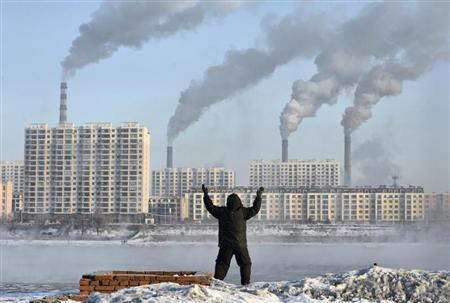Amid China air, water pollution, soil survey reveals century-old heavy metals
Date: 11-Apr-13
Country: CHINA
Author: David Stanway and Niu Shuping

An elderly exercises in the morning as he faces chimneys emitting
smoke behind buildings across the Songhua river in Jilin, Jilin
province, February 24, 2013.
Photo: Stringer
Soil samples across China have revealed remnants of toxic heavy metals dating back at least a century and traces of a pesticide banned in the 1980s, an environmental official said on Wednesday, revealing the extent of the country's pollution problems.
Street-level anger over air pollution that blanketed many
northern cities this winter spilled over into online appeals for
Beijing to clean water supplies, especially after rotting corpses of
thousands of pigs were found last month in a river that supplies tap
water to Shanghai.
Now Zhuang Guotai, head of the ecological department of the Ministry of Environmental Protection, said a nationwide soil survey showed the countryside had paid a heavy price for an agricultural revolution that has seen grain production almost double in the last 30 years, despite a much reduced workforce.
Soil pollution is regarded as one of China's most serious health threats, contaminating the food chain with pesticide and fertilizer run-offs as well as toxic elements like lead, arsenic and cadmium.
The problem is believed to be responsible for the high rate of birth defects and cancer in some of China's old industrial regions.
"There is a cost behind the nine consecutive years of bumper grain harvests," Zhuang said at a conference in Beijing. "They rely on the heavy use of fertilizer, but the country needs to boost grain production so it is quite a difficult issue."
Zhuang noted that as much as 65 percent of the fertilizer in China's countryside was improperly used and left to pollute rivers and fields.
"All pollutants ultimately end up in the soil, and when we did the soil survey, we saw that even metal pollution from a hundred years ago was present, as well as the '666' pesticide banned in the 1980s."
According to some researchers, as much as 70 percent of China's soil is affected.
China routinely vows resolve in cleaning up pollution, but little is ever done, due mainly to lack of enforcement in the face of a corporate drive for profits.
China's cabinet, the State Council, said recently that it would strive to establish a nationwide system to protect soil from pollution, but not until 2020.
The disclosure of data is part of China's commitment to improve transparency and allay widespread public suspicions that the government has routinely covered up the extent of the damage done by more than three decades of breakneck economic growth.
At the beginning of this year, Beijing agreed to improve the way it monitored and disclosed air pollution in its major cities. Just weeks later, record-high smog readings in the Chinese capital forced the government to impose emergency restrictions on cars and factories.
Zhuang said China aimed to release the results of the soil survey very soon, two months after access to the data was denied on the grounds that it was a "state secret".
He said the government always intended to disclose the survey results, which took four years to compile.
But Fang Yan, the deputy head of the rural department of China's state planning bureau, the National Development and Reform Commission, warned that too much disclosure was dangerous, noting that the reputation of the dairy industry still hadn't recovered from a melamine scandal in 2007.
"We can handle many things relating to China's food safety internally, and we mustn't stir things up because this will be bad for the whole industry," she told the conference.
(Reporting by Niu Shuping and David Stanway; Editing by Nick Macfie)
![]()
© Thomson Reuters 2013 All rights reserved